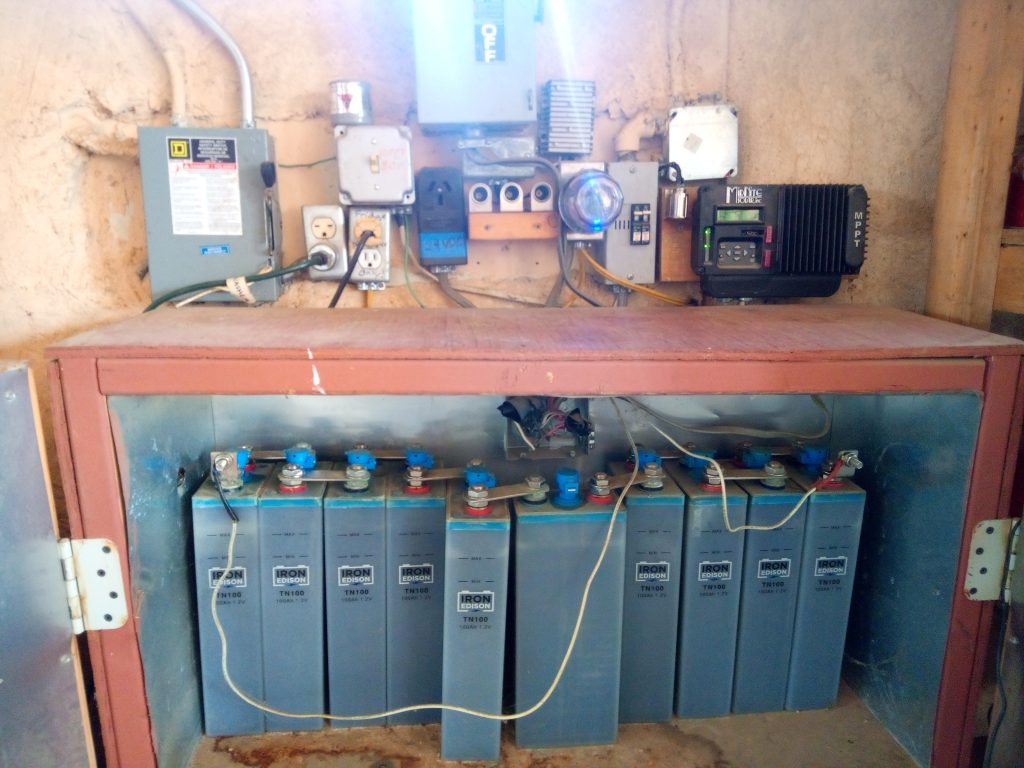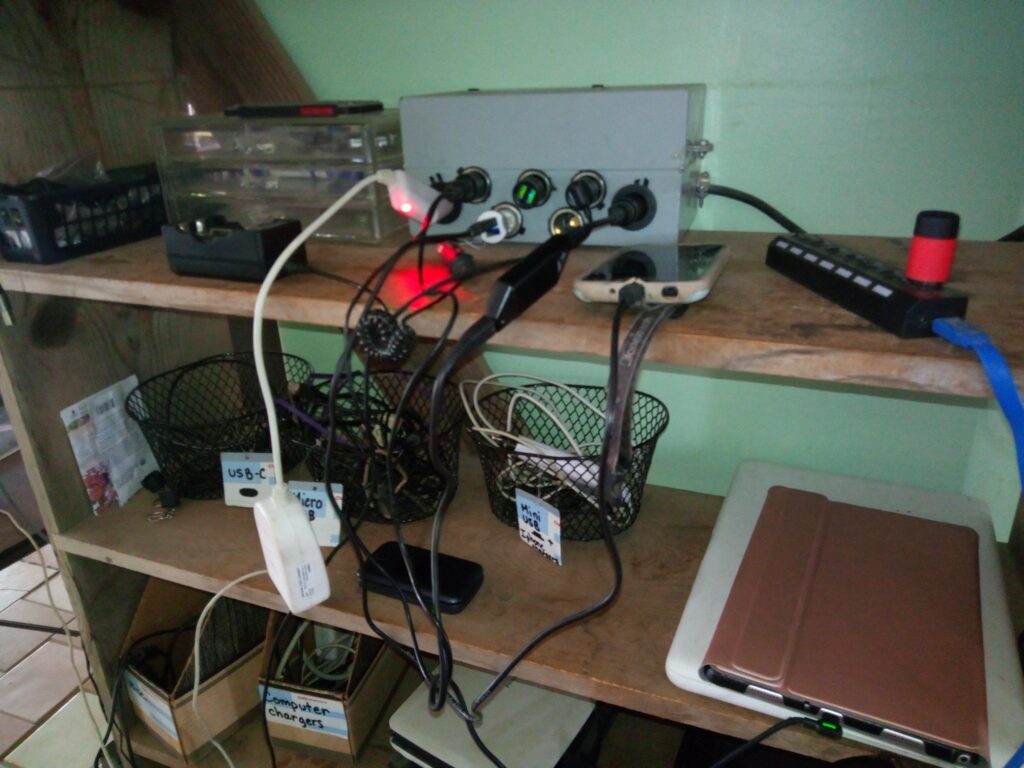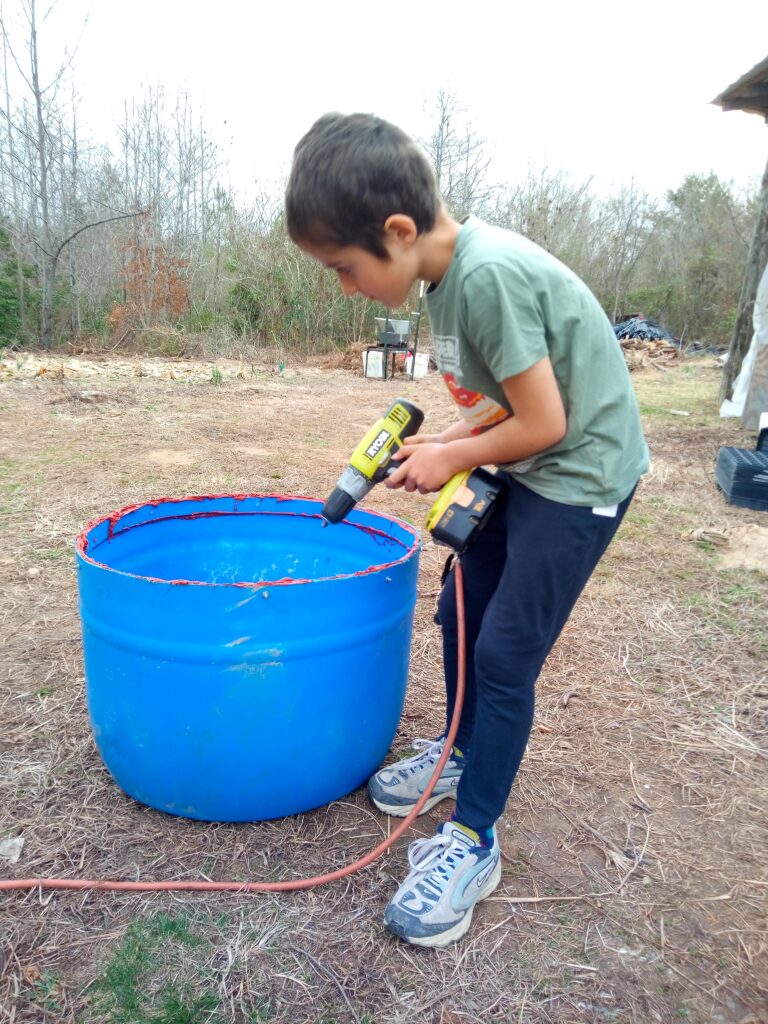Despite the greenwash and political cheerleading coming from large environmental groups, anyone who has worked with off-grid renewable energy systems knows that batteries are inherently problematic. Every battery technology has its drawbacks, whether it is expense, short lifespan, toxicity, or damage from deep cycling. While new battery technologies are always in the works, none will change the overall equation or make large battery-based solar systems affordable for the average global citizen.
That’s why at LEF our system design philosophy emphasizes the importance of minimizing demand on batteries using insulation, non-electric storage and daylight drive. As much as possible, we store energy in ways other than batteries- thermal mass, biogas and pressurized water, to name a few- and run our heavy electrical equipment only when the sun shines using daylight drive.
That said, we do use batteries for smaller loads like LED lights, fans and electronic devices in the context of a fully DC system, powering low voltage DC appliances directly off the battery, without inverters.
The battery technology we recommend most highly is nickel iron. Nickel iron batteries are more expensive than lead acid or lithium up front, but their unsurpassed durability make them the cheapest option when depreciated over the full lifespan of the battery. Also, nickel irons are the only battery technology that is truly undamaged by deep cycling. This trait is critical for off-grid systems without backup generators.
The Nickel Iron Battery Association has useful information, and explains how this durable technology has been largely left behind because of profit motive and planned obsolescence.
At LEF, we have two 12V 100 amp hour nickel iron battery sets that are wired separately. One is used exclusively for lighting our two large community buildings, which combined contain 15 small rooms and two large common areas. We use efficient LED bulbs ranging from 3 to 7 watts each. Keeping the bulb size small allows us to have reliable lighting even through cloudy spells in winter. The wiring, switches and fixtures for the lights are much the same as a conventional AC lighting circuit, but the bulbs are 12V DC LEDs.

Our other nickel iron battery set powers a charging station for laptops, phones, an internet router, and many other electronics, using cigarette lighter plug outlets. We use cigarette lighter plugs because most 12V DC equipment available on the market uses this kind of plug. We tell guests to purchase a car charger for their laptop if they want to use it during their visit.

Our first battery set was sourced from Iron Edison. For the first 5 years of our project we had only one 100 amp hour set, but as our community and electronics use grew, we found it useful to separate the charging system from the lights so that we do not have to be as careful with electronics use during long cloudy spells.
Both of our systems are protected with appropriately sized DC breakers or fuses, and a surge arrestor for lightening protection. Wiring and switches are sized according to the breakers in the system. While inverters are available on the market that would in theory work with these systems, we do not recommend powering inverters and AC appliances with these systems as you will quickly drain your battery and probably blow a fuse.
We do run personal comfort fans with these system, like this one which we have re-wired with a cigarette lighter plug. We also charge battery packs for cordless tools using car chargers, or wire the tools directly to the nickel irons when the battery packs die.

Our company, Living Energy Lights, offers two sizes of nickel-iron 12V battery kits and one smaller lithium battery kit. The nickel-iron kits are manufactured at LEF using batteries sourced from Ukraine and China. While more expensive, they are thoroughly repairable and with proper care the main components will last for several decades.
The lithium kit we sell is imported from Sunworth in China and has been quality tested at LEF. The kit is inexpensive but it is not repairable and will not last more than ten years. (Expected lifespan is more like 5 years or less if the battery is deep cycled.) Many other 12V lithium kits are available on the market, but we cannot vouch for their quality.
